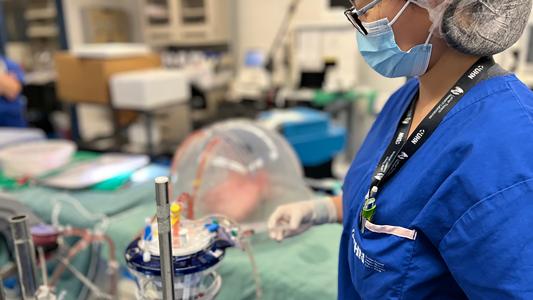Medical researchers are concerned that Russia’s invasion of Ukraine could disrupt some of the hundreds of clinical trials in the country, which could have ripple effects on global science and healthcare.
Why it matters: Lab and animal studies can’t tell us for sure if a new medicine or treatment will be safe and effective in people — that makes completing human clinical trials hugely important to medical research.
The disruption of trials would prevent collecting data and samples, setting back the whole lengthy drug approval process.
It also means people involved in the trials may be left receiving only part of a treatment regimen, something nobody ever intended.
Treatments for everything from cancer to arthritis are being trialed in Ukraine.
What’s happening in Ukraine? On February 24 — the same day Russian armed forces invaded Ukraine — biotech company Karuna Therapeutics said in a regulatory filing that the military operation could affect its EMERGENT-3 clinical trial, according to FierceBiotech.
This phase 3 trial is testing a new schizophrenia treatment, KarXT, and 10 of its 19 trial sites are in Ukraine.
“While our clinical trial sites in the Ukraine continue to actively recruit and treat patients, if political or civil conditions require it, our sites may need to delay or suspend clinical trial activities,” Karuna said in the filing.
Ten of the 19 sites in the phase 3 trial for Karuna’s schizophrenia treatment are in Ukraine.
After the first week of the Russian advance, it’s not clear how many other trials will be affected or delayed, but Karuna, at least, believes it is ready to deal with any potential disruption.
“Our clinical trial sites have contingency plans in place as part of their standard quality management practices for circumstances such as these and are prepared to initiate such plans when and if necessary,” it wrote.
The big picture: Ukraine is a popular location for clinical trials, and KarXT is just one of more than 200 in-development drugs and treatments with at least one clinical trial site in Ukraine — treatments for everything from cancer to arthritis are also being trialed in the nation.
In many cases, these Ukraine sites are part of larger, international trials by major pharma companies, including GlaxoSmithKline and AstraZeneca, who will combine the data across countries to secure approval for their treatments in Europe, the U.S., and elsewhere.
While the results would likely come faster and be stronger with data from Ukraine, these clinical trials may be able to reach their desired endpoints from other sites, depending on what regulators will accept.
We’d love to hear from you! If you have a comment about this article or if you have a tip for a future Freethink story, please email us at [email protected].






